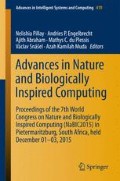Abstract
Social dilemma is a challenge to many scientists. The Prisoner’s Dilemma and Snowdrift game were the most used social dilemma models in the cooperation evolution. A particularly effect to the evolutionary process comes from population structure. By comparing population structures that amplify selection with other population structures, both analytically and numerically, we show that evolution also affected by the cost to benefit ratio and neighbor number.
Access this chapter
Tax calculation will be finalised at checkout
Purchases are for personal use only
References
Chong, S.Y., Yao, X.: Behavioral diversity, choices and noise in the iterated prisoner’s dilemma. IEEE Trans. Evol. Comput. 9(6), 540–551 (2005)
Chong, S.Y., Yao, X.: Multiple choices and reputation in multiagent transactions. IEEE Trans. Evol. Comput. 11(6), 689–711 (2007)
Chong, S.Y., Tiño, P., Yao, X.: Measuring generalization performance in coevolutionary learning. IEEE Trans. Evol. Comput. 12(4), 479–505 (2008)
Chong, S.Y., Tiño, P., Yao, X.: Relationship between generalization and diversity in coevolutionary learning. IEEE Trans. Comput. Intell. AI Games 1(3), 214–232 (2009)
Wang, X.Y., Chang, H.Y., Yi, Y., Lin, Y.B.: Co-evolutionary learning in the n-choice iterated prisoner’s dilemma with PSO algorithm in a spatial environment. In: 2013 IEEE Symposium Series on Computational Intelligence, pp. 47–53. IEEE press, Singapore, 2013
Darwen, P.J., Yao, X.: Co-evolution in iterated prisoner’s dilemma with intermediate levels of cooperative: Application to missile defense. Int. J. Comput. Intell. Appl. 2(1), 83–107 (2002)
Ishibuchi, H., Namikawa, N.: Evolution of iterated prisoner’s dilemma game strategies in structured demes under random pairing in game playing. IEEE Trans. Evol. Comput. 9(6), 552–561 (2005)
Zheng, Y., Ma, L., Qian, I.: On the convergence analysis and parameter selection in particle swarm optimization. In: Processing of International Conference of Machine Learning Cybern., pp. 1802–1807 (2003)
Franken, N., Engelbrecht, A.P.: Comparing PSO structures to learn the game of checkers from zero knowledge. In: The 2003 Congress on Evolutionary Computation, pp. 234–241 (2003)
Ishibuchi, H., Takahashi, K., Hoshino, K., Maeda, J., Nojima, Y.: Effects of configuration of agents with different strategy representations on the evolution of cooperative behaviour in a spatial IPD game. In: IEEE Conference on Computational Intelligence and Games, 2011
Axelrod, R.: The Evolution of Cooperation. Basic Books, New York (1984)
Moriyama, K.: Utility based Q-learning to facilitate cooperation in Prisoner’s Dilemma games, Web Intelligence and Agent Systems: An International Journal, vol. 7, pp. 233–242. IOS Press, 2009
Chen, B., Zhang, B., Zhu, W.D.: Combined trust model based on evidence theory in iterated prisoner’s dilemma game. Int. J. Syst. Sci. 42(1), 63–80 (2011)
Chong, S.Y., Tiño, P., Ku, D.C., Yao, X.: Improving generalization performance in co-evolutionary learning. IEEE Trans. Evol. Comput. 16(1), 70–85 (2012)
Zheng, D.F., Yin, H.P., Chan, C.H., Hui, P.M.: Cooperative behavior in a model of evolutionary snowdrift games with N-person interactions. Europhys. Lett. 80(1), 18002 (2007)
Chiong, R., Kirley, M.: Iterated N-player games on small-world networks. In: GECCO’11, Jul. 2011
Nowark, M.A.: Five rules of the evolution of cooperation. Science 314, 1560–1563 (2006)
Watts, D., Stogatz, S.H.: Collective dynamics of small-world networks. Natrue 393, 440–442 (1998)
Acknowledgment
This work is supported by two research program of China. One is the Zhongshan Science and Technology Development Funds under Grant no. 2014A2FC385, the Dr Startup project under Grant no. 414YKQ04, and also supported by Production, learning and research of Zhuhai under Grant no. 2013D0501990003.
Author information
Authors and Affiliations
Corresponding author
Editor information
Editors and Affiliations
Rights and permissions
Copyright information
© 2016 Springer International Publishing Switzerland
About this paper
Cite this paper
Wang, X., Zhang, L., Du, X., Sun, Y. (2016). Cooperation Evolution in Structured Populations by Using Discrete PSO Algorithm. In: Pillay, N., Engelbrecht, A., Abraham, A., du Plessis, M., Snášel, V., Muda, A. (eds) Advances in Nature and Biologically Inspired Computing. Advances in Intelligent Systems and Computing, vol 419. Springer, Cham. https://doi.org/10.1007/978-3-319-27400-3_6
Download citation
DOI: https://doi.org/10.1007/978-3-319-27400-3_6
Published:
Publisher Name: Springer, Cham
Print ISBN: 978-3-319-27399-0
Online ISBN: 978-3-319-27400-3
eBook Packages: Computer ScienceComputer Science (R0)

